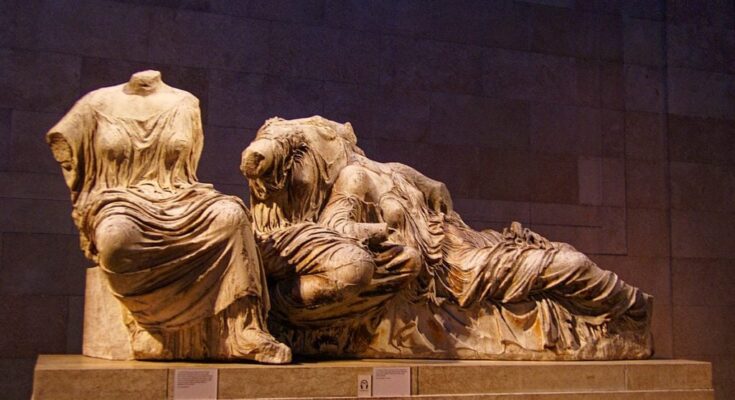United Kingdom Labour leader Sir Keir Starmer, the likely winner of Thursday’s election, has stated that he is “open to return[ing] the Parthenon Sculptures to Greece.”
The statement was made in November 2023 in an interview with the Daily Mail online, with the Labour party leader for the premiership adding that he “won’t raise the issue publicly until after the general election as he fears upsetting Tory voters,” it has been claimed.
According to the report, UK Labour party leader Starmer was reportedly privately open to handing back the 2,500-year-old Parthenon Sculptures to Greece but fears upsetting Tory voters if he speaks about it publicly.
Later in November 2023, when Greek Prime Minister Kyriakos Mitsotakis went to London for a scheduled meeting with current British PM Rishi Sunak to discuss the issue of returning the Parthenon Sculptures to Greece among other topics, the latter canceled the meeting just hours before it was scheduled. The Greek PM openly expressed his disappointment for the diplomatic faux pas of his British counterpart.
Previous to the scheduled meeting, a Downing Street spokesman said that Sunak is unwilling to consider returning the Parthenon Marbles from the British Museum to Greece.
Explaining his attitude towards the Greek Premier in the House of Commons, Sunak said that “it was clear that the purpose of the meeting was not to discuss substantive issues for the future, but rather to grandstand and relitigate issues of the past,” according to a Euronews report.
Now, Greece is expecting the outcome of the UK election to see if the return of the precious sculptures will finally materialize under the imminent premiership of UK Labor party leader Starmer, based on the polls.
According to a BBC report published on Wednesday, polls show the Labour Party coming in first with a 39 percent of the vote (range 34-44 percent) while the Conservative Party follows second with 21 percent (range 16-26 percent).
The Parthenon Sculptures and “Mona Lisa cut in half”
While in London in November, the Greek Prime Minister spoke to BBC in an interview and discussed the Parthenon Sculptures and Greece’s rightful demand for them to be returned to their marble “siblings.”
During the interview, Mitsotakis spoke about the taking by Lord Elgin of half of the marble frieze, metopes, and pediments from the Acropolis Parthenon, leaving the other half behind. What Greece wants is the reunification of the priceless sculptures to the place where they belong.
Imagine having Leonardo Da Vinci’s Mona Lisa cut in half and the two parts exhibited in two different museums, one in the British Museum and the other in the Louvre, Mitsotakis said, wondering if people would appreciate it. The point Greece is stressing is “reunification” not ownership.
According to Greece’s Ministry of Culture, “the Parthenon Sculptures are not freestanding pieces of art. They were created as architectural and symbolic parts of the temple of Athena, built in the 5th century BC…The concept realized in the construction of the building is balance through symmetry, summed up in the triad of metopes, frieze and pediments. The monument is fully understood only with its sculptures and the sculptures are meaningful only next to the temple, in their natural and historical environment.”
The Greek proposal expressed by the Ministry of Culture is the reunification of the sculptures in a large hall in the Acropolis Museum in collaboration with the British Museum, which will participate in the restoration. “Displaying the Parthenon Sculptures in unity will… reveal to future generations the achievements of mankind.”
British Museum refuses return of Parthenon Sculptures to Greece but discusses a loan
So far, the British Museum clings to rights of ownership of the Parthenon Sculptures without, however, the existence of documents to support the claim. According to Lord Elgin, he had asked permission from the Ottoman Sultan in Constantinople, who exercised authority in Athens at the time. Nonetheless, no such papers exist.
Greece, on the other hand, seeks the return of the sculptures through the UNESCO “Return & Restitution” committee, claiming that they were actually stolen from Greece by Lord Elgin, who was planning to create a personal museum.
George Osborne, chairman of the British Museum’s board of trustees, has expressed his hope that an agreement can be reached with Athens for a temporary return of the Parthenon Sculptures in the form of a loan. Artifacts from Greece would temporarily be loaned to the British Museum in exchange.
Will the new UK Labour government return the Parthenon Sculptures?
Greece is hoping that the new UK Labour party government will deal favorably with the ongoing, decades-old dispute of the return of the Parthenon Sculptures to Greece.
According to the Ministry of Culture, in March 2000, The Economist conducted a poll on the question: “If there was a free vote in Parliament for the return of the Elgin marbles to Greece, would you support it or not?” Sixty-six percent of the members of the British Parliament voted for the return of the Parthenon Sculptures to Greece and 34 percent against. Of those in favor, 84 percent of Labour MPs voted for the return of the Parthenon Sculptures, while 16 percent voted against this.
Now, Greece is expecting the UK election outcome to see if the Labour Party and Sir Keir Starmer will continue supporting the Greek request for the return of the Parthenon Sculptures to their natural habitat.



